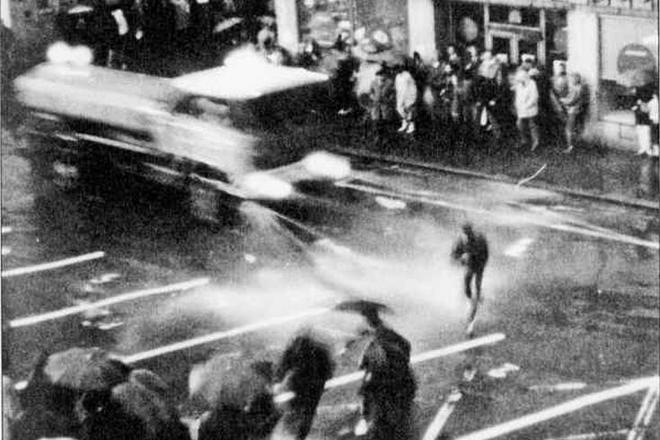THOUSANDS of people entered the streets on March 25, 1988, with candles in their hands to protest against the oppression of human and religious freedom by the communist regime, which responded by sending state police units and water cannons against the praying crowd. The Candlelight Demonstration, which took place 25 years ago, entered history as the most significant public protest against the communist regime after 1968, when Warsaw Pact forces had invaded Czechoslovakia to suppress the Prague Spring. Personalities who stood behind the protest say that the Candlelight Demonstration, which made the country internationally visible in its fight against the totalitarian regime, has a unifying message even today.
“Until the very last moment we did not know whether this activity would have a place in Slovakia,” said the initiator of the idea of the Candlelight Demonstration and former representative of the World Congress of Slovaks, Marián Šťastný, when marking the 25th anniversary of the event, as quoted by the TASR newswire. “When it happened in Slovakia it came as a surprise even for us.”
A letter written by a Slovak man calling for an international response to the oppression of freedom in Slovakia while asking “what are you doing in that World Congress of Slovaks if in Slovakia they are imprisoning and arresting priests” was partly what motivated Šťastný, one of a legendary trio of ice-hockey-playing brothers, according to the SITA newswire.
“It was in my interest that the largest possible group of people, including believers and non-believers, participated, as the universal rights and freedoms we knew in democratic society were in question,” Šťastný said, as quoted by SITA.
The Candlelight Demonstration was then organised by Catholic dissidents, including Bishop Ján Chryzostom Korec, Ján Čarnogurský, who later became justice minister and chairman of the Christian Democratic Movement (KDH), František Mikloško, who later became a KDH MP, and physician Silvester Krčméry, who together with Vladimír Jukl, a Catholic priest, founded a secret underground movement during communism.
The Catholic dissident movement in Slovakia functioned as one of the main sources of opposition to the regime.
A series of events organised by the Forum of Christian Institutions (FKI), a civic association sheltering 30 institutions in Slovakia, took place in Bratislava to commemorate March 25, which since 1993 has been observed in Slovakia as the Day of Fighting for Human Rights. An event which included a meeting for prayer was held at Hviezdoslavovo Square on March 25, along with the unveiling of the Wall of Inconspicuous Heroes at the Museum of Crimes and Victims of Communism as well as a formal colloquium called the Story of Our Freedom.
Yet, the importance of the Candlelight Demonstration transcended the borders of what was then Czechoslovakia. Angelo Bonaguro from the international Communio e Liberazione movement, whose members were in contact with Slovak Christian dissidents, said that it brought testimony to people in the West.
“It was not the story of your freedom only, but also of ours,” Bonaguro, who currently works for the Russia Cristiana foundation, said as quoted by SITA on March 22.
Members of the Communio e Liberazione travelled to Czechoslovakia during communism, where they had contacts with dissidents such as Krčméry and Jukl. The organisation knew about the planned demonstration in advance, with “two of our friends attending the demonstration itself, who then told us about it,” said Bonaguro, according to SITA.
Recalling the message of the Candlelight Demonstration, Čarnogurský said that it was an expression of the will of a large group of people which still has the power of unification.
“No one has ever protested or questioned the Candlelight Demonstration,” Čarnogurský said, as quoted by TASR, adding that the demonstration called for religious freedom and civil rights, which was a combination “no political science institute in Europe would have ever been able to bring together”, but it was exactly this combination which brought people together in Slovakia.
Čarnogurský said that there is a message for contemporary times: “Let’s have the courage to be distinct.”



 Police dispersed the crowd with water cannon in March 1988. (source: ÚPN archive)
Police dispersed the crowd with water cannon in March 1988. (source: ÚPN archive)